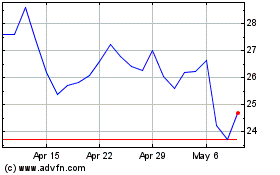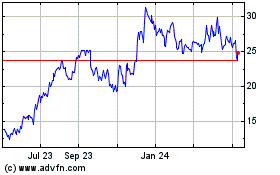By Alexandra Berzon and Peter Grant
President Donald Trump's company receives tens of millions of
dollars a year from Vornado Realty Trust, which relies on the
federal government for a significant portion of its revenue and is
vying for new work from Mr. Trump's administration.
Mr. Trump and Vornado's founder and chairman, Steven Roth, have
forged a yearslong relationship, with Mr. Trump's family company a
minority owner of two skyscrapers controlled by Vornado. Messrs.
Trump and Roth are friends, and Mr. Trump said in January that he
had appointed Mr. Roth as co-chairman of a council charged with
overseeing the president's potential $1 trillion
infrastructure-spending plan.
Mr. Trump has said that while he is in the White House, he won't
personally be involved in his real-estate business, which is being
run by his sons. He has rejected calls to sell his assets or put
them in a blind trust, and he remains the assets' owner.
Two of the most valuable real-estate assets in Mr. Trump's
company, the Trump Organization, are 30% stakes in a pair of office
buildings controlled by Vornado.
The Trump Organization's stake in 1290 Sixth Avenue in Manhattan
is worth $428.9 million, according to an analysis for The Wall
Street Journal by a financial-services firm that provided the data
on the condition it not be named. The 43-story skyscraper generates
about $14.7 million in annual cash flow for Mr. Trump's company,
according to the analysis.
The Trump Organization also owns 30% of 555 California Street in
San Francisco, with Vornado holding the other 70%. The Trump stake
is worth $322.6 million, the analysis shows. That 52-story
building, previously named the Bank of America Center, produces an
estimated $8 million in annual cash flow for Mr. Trump's company,
according to the analysis.
The amount of money the Trump Organization gets annually from
its Vornado partnerships isn't affected by how much government
business Vornado gets. But the Trump administration's decisions
could benefit -- or hurt -- Vornado's bottom line. And at the same
time, Vornado decides how much Mr. Trump's company -- the
properties' only other owner -- receives from the partnership each
year, according to people familiar with the matter.
Vornado has full control of both buildings' finances. It is up
to Vornado to decide how much of their incomes are held for capital
upgrades and other long-term expenses and how much of the income is
profit. Of that bottom-line figure, Vornado has to distribute 30%
annually to Mr. Trump's company, the people said.
The Trump Organization declined to comment and the Trump
administration didn't respond to requests for comment for this
article.
Messrs. Roth and Trump haven't reached new deals in recent
years, the people said. Mr. Roth on Tuesday was circumspect about
his relationship with President Trump when discussing the
infrastructure council on a conference call with analysts to
discuss Vornado's earnings. "I know President Trump. I've known him
for a very long time. We have had dealings together," he said.
Mr. Roth also said he was "honored" to be named to the council
and pointed out that he wasn't "in any way an employee of the
government."
Vornado also had a business relationship with Jared Kushner, the
president's son-in-law and now a senior White House aide. In 2011,
Vornado bought a 49.5% stake in the mixed-use tower at 666 Fifth
Avenue in Manhattan from Kushner Cos., where Mr. Kushner at the
time was chief executive. The next year, Vornado purchased retail
space in the building for $710 million.
Mr. Kushner resigned from his family company and is selling some
of his sizable portfolio to family members and taking other steps
to avoid conflicts of interest, according to people familiar with
the matter.
Vornado, meanwhile, has much riding on its relationships with
the federal government.
The company, a major owner of buildings in Washington and other
U.S. cities, counts the U.S. government as its largest tenant.
Vornado reported that the U.S. government represented around 6% of
its annual lease revenue in the third quarter of 2016, or around
$140 million.
Vornado is among the developers bidding to build a new Federal
Bureau of Investigation headquarters in Washington's suburbs, a $2
billion project, the Washington Post has reported. The selection
process will be run by the U.S. General Services Administration, or
GSA, part of the executive branch. Vornado has declined to comment
on this report.
People familiar with the GSA process say it has protocols in
place to prevent influence or favoritism. The bureaucratic process
means that the bidding and leasing process can take years.
"It creates a big distance between people who have immediate
political interests and the actual ability to execute them," said
Dan Tangherlini, a former GSA administrator. The GSA didn't respond
to a request for comment.
Vornado also is involved in a high-profile New York project
dependent on federal funds. Last fall, a team of Vornado, Related
Cos. and Skanska AB was named under New York Gov. Andrew Cuomo's
administration, to create a $1.6 billion train hall and retail
space in the James A. Farley Building in Manhattan, currently the
home of a post office facility. A portion of the funds is expected
to come from the federal government, Mr. Cuomo has said, but all of
the commitments haven't been made.
If the project goes ahead, it would give Vornado a boost because
the company is the largest office building owner in the surrounding
area. On an earnings call in August, when asked about the James A.
Farley project, Mr. Roth called the area the "big kahuna" for
Vornado.
The Washington region is Vornado's second-largest market after
New York. In 2016, Washington made up around 21% of the company's
$2.5 billion in revenue, according to company financial
documents.
In recent years, Vornado has been on the losing end of federal
decision-making. The Department of Defense pulled out of 2.4
million square feet of Vornado office space and moved to military
bases as part of a plan first initiated by the George W. Bush
administration to relocate military offices.
Mr. Roth in 2013 estimated that the Pentagon's office
relocations cost Vornado $70 million in earnings a year. Government
vacancies, he said on an investor conference call that year, are
"the eye of the storm for our company."
At the end of 2016, the company gave a massive Virginia complex
once used primarily as Department of Defense offices over to
debtholders after that property struggled to maintain occupancy
amid the military realignment. That caused revenue in the fourth
quarter from government leases to drop significantly, according to
analysts. Vornado reported that in the fourth quarter of 2016 its
revenue from the government declined to 3.8% of its total
revenue.
Over the next four years, Vornado is set to negotiate renewals
on 28 expiring leases with the federal government, according to
people familiar with the company.
Vornado is planning a spinoff of its Washington office buildings
and apartments, the company has said. The transaction, slated for
completion by the second quarter of 2017, would combine Vornado's
holdings in the region with those of JBG Cos., a Washington
landlord. The merger would create a landlord named JBG Smith with
12.6 million square feet of office space and more than 4,400
apartments in the area. Vornado shareholders will own a 74% stake
in the merged company. Mr. Roth will be its nonexecutive
chairman.
Write to Alexandra Berzon at alexandra.berzon@wsj.com and Peter
Grant at peter.grant@wsj.com
(END) Dow Jones Newswires
February 18, 2017 17:31 ET (22:31 GMT)
Copyright (c) 2017 Dow Jones & Company, Inc.
Vornado Realty (NYSE:VNO)
Historical Stock Chart
From Mar 2024 to Apr 2024

Vornado Realty (NYSE:VNO)
Historical Stock Chart
From Apr 2023 to Apr 2024
